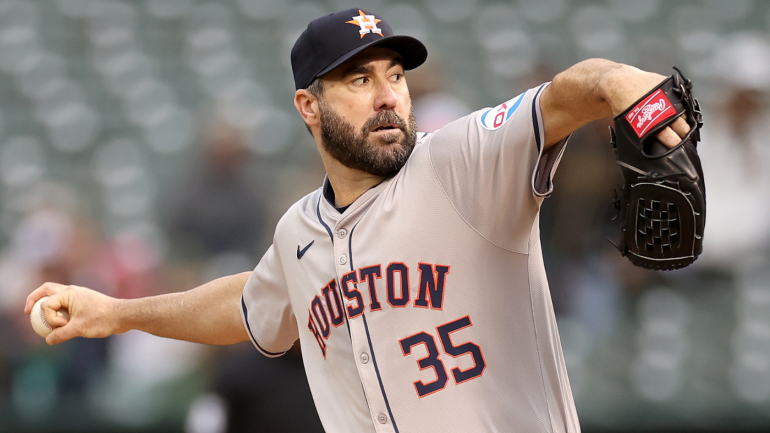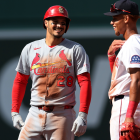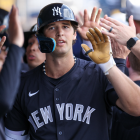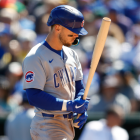
Houston Astros veteran moundsman Justin Verlander twirled a strong outing in his team's 6-3 win over the A's on Friday night:
The win is mostly notable for the Astros' improving fortunes -- they're 13-9 in May after coming out of April with a deeply disappointing mark of 10-19 -- and it's also notable for a couple of Verlander benchmarks. First, those nine strikeouts (Verlander's most in a start this season) give him 3,377 for his career and push his past Hall of Famer Greg Maddux for 10th place on the all-time strikeouts list. Here's an updated look at said list:
| Pitcher | Career strikeouts |
|---|---|
1. Nolan Ryan | 5,714 |
2. Randy Johnson | 4,875 |
3. Roger Clemens | 4,672 |
4. Steve Carlton | 4,136 |
5. Bert Blyleven | 3,701 |
6. Tom Seaver | 3,640 |
7. Don Sutton | 3,574 |
8. Gaylord Perry | 3,534 |
9. Walter Johnson | 3,509 |
10. Justin Verlander | 3,377 |
Given health and effectiveness the rest of the way, it's possible Verlander could get to 3,500 career strikeouts this season. Whatever the future on that front, he's already in the elite-est of elite company when it comes to strikeouts.
Speaking of future milestones for Verlander, the victory on Friday also occasioned the 260th win of his career, which ties him with Ted Lyons for 41st place on the all-time wins ledger. While 260 is not an especially resonant figure in baseball, it's notable in that it's a checkpoint on the way to the much more vaunted 300.
In all, just 24 pitchers have won 300 or more career games, and no one has achieved the feat since Randy Johnson in 2009. Given usage trends with starting pitchers -- they're pitching less than ever and thus clocking wins at a historically low clip -- it's not hard to find those who wonder aloud whether we'll ever see a 300-game winner again. Until further notice, Verlander and his 260 wins are the best (and last?) chance.
So what are the chances that the 41-year-old future first-ballot Hall of Famer and three-time Cy Young winner will pick up those remaining 40 wins? The first essential component is a willingness to play to such an advanced baseball age, and Verlander seems to check that box. About that prospect -- i.e., staying in the game long enough to reach 300 wins -- Verlander told reporters this less than a year ago:
"It's definitely still possible.
"Look, it's not the reason I'm still pitching, but I'd love to do it," Verlander said. "I love the game. But, it's simple math. I need 15 more a year, for what, three more years? If I play five or six more years, I should get there. I'm just trying to extend my window as long as possible and still be good. If I play until I'm 45 or 46, it's still very plausible."
How plausible? To get some semblance of an idea of Verlander's chances, we'll be calling upon Bill James' "favorite toy" formula. The favorite toy is a decidedly quick and thoroughly dirty way to project a player's career total in whatever counting measure you can dream up. It's a blunt instrument and it skews a bit conservative sometimes, but it does give you a rough idea of, say, how many wins Verlander might amass in his working life.
The favorite toy requires three years of major-league data to work properly, and the more recent the better. As such, we'll need to project Verlander's 2024 win total.
Verlander's start to this season was delayed because of a spring case of shoulder inflammation, which may have contributed to his inconsistency thus far in 2024 and helps explain why he presently has just three wins. Turning to the ZiPS rest-of-season projections available at FanGraphs, we see that Verlander is projected to pick up seven more wins 2024, so we'll use 10 as his total for this year in the favorite toy formula and thus 267 for his career tally. Also in the mix are his 13 wins with the Mets and Astros last season and his 18 wins with Houston in 2022.
So what does the favorite toy tell us after providing those inputs plus Verlander's age? Here's the executive summary:
"Based on his age, your player can be expected to play for 1.5 more years, at an average of 12.3 per year. At that rate, he will finish at 285 for his career. He has a 6% chance to reach 300."
The system is not exactly bullish on Verlander's chances, but, again, it's a bit conservative in nature. I'll take the over on that 6% figure, while still acknowledging that Verlander is not likely to reach 300. If he does indeed end 2024 with 267 wins, then he'll need the following averages in order to join the 300 club:
- 11 wins per season over three seasons.
- 8.25 wins per season over four seasons
- 6.6 wins per season over five seasons, which would take him through his age-46 campaign.
Again, let's note based on the Verlander quote above that the will to continue playing seems to be there. He has a $35 million player option for 2025 that automatically kicks in if he logs at least 140 innings this season and is free of significant arm trouble heading into the offseason. Beyond that semi-knowable horizon, much of course depends on Verlander's effectiveness.
That situation bears monitoring. He's been an above-average starting pitcher thus far in 2024 (3.60 ERA, 107 ERA+), and those of course tend to remain employed (especially those with a demonstrated history of late-career greatness like Verlander). Also, Verlander figures to continue hitching his wagon to strong on-paper contenders, which in theory and in general means more run support and thus better chances of logging wins. On the downside, Verlander's fastball velocity, strikeout rates, whiff rates, and chase rates are all down thus far in 2024, and that may bode ill for the future if all that keeps up. Still, he's just 40 innings into his season and is still likely feeling the effects of an interrupted spring. Let's see how things look with a larger sample.
If nothing else, Verlander's chase for 300 is a situation worth monitoring. That's especially the case given the elusive nature of the benchmark in contemporary times and Verlander's apparent determination to threaten it. He's got a shot, which is something no other pitcher has been able to say for a long time.
![[object Object] Logo](https://sportshub.cbsistatic.com/i/2020/04/22/e9ceb731-8b3f-4c60-98fe-090ab66a2997/screen-shot-2020-04-22-at-11-04-56-am.png)





















